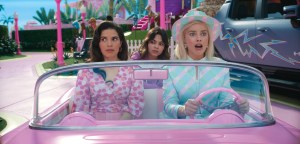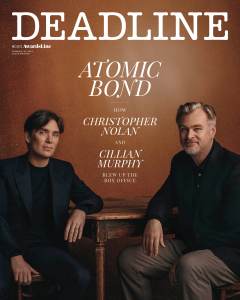By her own admission, America Ferrera was not a Barbie girl growing up. But now, two decades into her career, Ferrera will be forever bathed in the warm pink glow of the Mattel brand thanks to her role in Greta Gerwig’s Barbie. Ferrera plays a central role as Gloria, a Mattel employee dealing with an existential crisis in the real world, that sends a ripple into Barbie Land and awakens Margot Robbie’s stereotypical Barbie. After Barbie’s female utopia falls prey to a patriarchal coup spearheaded by Ryan Gosling’s Ken, Gloria steps in to set things right. Here, Ferrera reflects on womanhood, her career and making her directorial debut.
DEADLINE: Post-Barbie, have you been able to fully wrap your mind around being a part of the girlhood lexicon forever? But of course, you have been since Real Women Have Curves, The Sisterhood of the Traveling Pants and Ugly Betty. Looking back, do you think this was intentional?
AMERICA FERRERA: There is a lot of looking back and thinking, ‘Damn, I did that,’ especially when you get nominated for an Academy Award, which is still very hard for me to say with a straight face. Sometimes, I have to whisper it if I’m telling somebody because it sounds wild whenever I say it out loud. I think a lot about my 5-year-old self, my 9-year-old self, my 12-year-old self, my 16-year-old self, and how she had this insane dream that was so improbable for a poor, short, fat, brown daughter of Honduran immigrants. I had no way of knowing how to get there from where I was, and you can’t see [your career] living it forward. You can only see it looking back, and it’s amazing to look back at 23 years of a career.
I think the thing that I feel the most blessed about in my career is how much I have loved the things I’ve gotten to be a part of. I think that it is an enormous amount of luck and getting to be in the right place at the right time. But at the same time, even when I was really young, I had such a strong sense of what was a ‘yes’ and a ‘no’ for me. I remember specifically, while in college, I did a really stupid thing and bought a really expensive car, and I couldn’t afford to put gas in it. I couldn’t even afford my books because I mainly paid for my own tuition and everything. I got an offer to do a legal procedural pilot and was being offered more money than I’d ever seen in my bank account. I remember thinking that I really needed this money, but I wasn’t willing to say yes to something that felt like a no, even when I needed it.
So, I think back to moments like that and am proud of the work I chose to be a part of. I’m proud of young America, who made good choices. I’m proud of her because she worked hard to be prepared when the luck and opportunities came her way. Because I do think luck and opportunity is the majority of it, but also being prepared for it and knowing what’s right for you is also part of the game, so I’m proud of it.
America Ferrera in Barbie.
Warner Bros./Everett Collection
DEADLINE: You’ve talked about not having a personal attachment to Barbie dolls as a child. How did you find your way into the Barbie movie and playing Gloria?
FERRERA: It’s true. I didn’t play with Barbies growing up. I didn’t have any strong feelings about Barbie one way or the other because I didn’t feel that connected or represented in it, so unless I was at my cousin’s house, we’d play with her Barbies. But when I first read the script after Greta Gerwig emailed me, “We wrote this character of Gloria with your voice in our head, just read it,” it then became obvious how hilarious and subversive it was, and the utter surprise and delight that I felt when I met the character Gloria in the script and discovered that Greta and Noah [Baumbach] made this choice to not only include a real-life grown woman’s perspective of womanhood but also make her the driving force of the action.
Seeing Gloria’s climax, where she says what she needs to hear for herself, but also that all the Barbies need to hear, and that all of us need to hear, which was about pulling the curtain on this insane assignment that we take on as women. It was so insanely unexpected to open a Barbie script and get there with it, so by the time I was done with the script, it wasn’t really about whether I love Barbie. It was about us. All the feelings we have about Barbie are about us. Humans made her. Humans give her meaning.
So in the end, it wasn’t about do I have love and feelings for Barbie, which I do because it’s brilliant storytelling, but [I related to Gloria because] I’m very earnest, I love my work, and I love to play, and the permission to be able to be a grown adult woman who’s taken seriously and who can hold reality, and the frustrations and disappointments of being a real grown-up woman in this world, but at the same time not deprive yourself of access to what brings you joy and what makes you feel like a child again. It felt like I’m always looking for that permission to be a grown-up who’s taken seriously and loves to play, imagine and create unabashedly.
DEADLINE: Gloria and Barbie’s relationship is unique because Gloria reverts to nostalgic childhood memories to get through her current listlessness. But then, Barbie is this source of empowerment for Gloria too, because they work together to dismantle the newly introduced patriarchy. How did you work with Margot and Greta to facilitate this relationship?
FERRERA: Our earliest conversations were about how the love story, if there was going to be one, was really between Barbie and Gloria. This isn’t a Barbie and Ken love story. These two women, real and imagined, are calling to each other. They need each other to move forward to become the fuller version of themselves. I know there are a lot of people on the internet who ship Barbie and Greta. And I love that reading of it. But I think they’re picking up on what we all talked about: Gloria falling in love with possibility again and Barbie falling in love with imperfection. Barbie falling in love with what it means to be human. And they do fall in love with each other in each other’s worlds. They changed each other. You can see that connection in the scene where Gloria pulls up to Mattel headquarters, and the camera pushes in on both of them, and it’s that meet- cute moment where they stare at each other like, “It’s you, it’s always been you.”

From left: Ferrera, Ariana Greenblatt and Margot Robbie in Barbie.
Warner Bros./Everett Collection
DEADLINE: Gloria’s monologue touches on how women try to exist in the world while navigating a lot of societal constraints placed on woman. How did you personally relate to that in terms of your acting journey? How did you navigate your self-doubts and stay on this path?
FERRERA: When I started out, I had an irrational level of confidence. I didn’t know what I didn’t know, but everything was just sheer force of will and instinct. I never went to acting school. I acted in my public middle and high school programs and community college, but it was on a wing and prayer where I believed in myself. I remember it was the second season of Ugly Betty, where we did 24 episodes a season for an hour-long television show. We were into the second season, and I remember getting to this point where I was sick of myself. I could feel myself doing all my tricks, and it felt like I was on autopilot. I’d never been on a TV show before. I never had to play a character for a year, much less for multiple seasons. And I thought, “I don’t know how to do this.” I’ve never built a creative process because I never went to acting school.
That was my “oh shit” moment of, like, I’ve got to get a toolbox, get some tools and learn how to carry the toolbox. I remember calling my manager to ask for an acting teacher so I could figure out how to be on a TV show for multiple years and not hate myself and know how to keep growing and evolving the character. I then met my creative coach, Kim Gillingham, and I’ve been with her for about 17 years. Working with her and a community of artists to understand that acting is a craft that I step in and out of, and not just something where I open my veins and walk around hoping that this time I’ll get to where I need to get, which was a lot of my early career because I didn’t know any other way. That process helped me evolve as an actress and to get to explore more facets of myself as an actress through process.

Read the digital edition of Deadline’s Oscar Preview issue here.
DEADLINE: Next, you’re working on your feature directorial debut, I Am Not Your Perfect Mexican Daughter. What can you share about that project and how it evolved? Why was it important for you to make this book adaptation your debut?
FERRERA: This beautiful novel by Erika L. Sánchez is a coming-of-age story about a young Mexican American girl who is an artist and poet struggling with mental health. There’s a tragic accident where she loses her sister, and she and her whole family are dealing with grief. Essentially, it’s about being an incredibly sensitive young person who feels a lot without the support of how to survive living in a brutal world. I loved this book so much that I met with Erika to get to know her. Then, years later, it came to me as a script written by Linda Yvette Chávez, who I executive produced for her TV show Gentefied for Netflix.
I wasn’t necessarily looking to direct a feature film, but this felt like an opportunity to tell a coming-of-age story from the perspective of the girls that Erika, Linda and I were. The opportunity to tell that story for all the other kids who feel that way, all the other bleeding-heart artists out there, is just like such a dream.

